It is always – always a good and important time to be championing the voices of Indigi-Queer artists who are making waves and being such a source of representation. From theatre to television, online content to published works and beyond—Queer, Indigenous, 2-Spirit folks are Getting. It. Done.
One of those folks is Devery Jacobs (Rutherford Falls, Rhymes for Young Ghouls, Blood Quantum). The Kanien’kehá:ka award-winning performer, writer and filmmaker from Kahnawà:ke Mohawk Territory stars in the upcoming series, Reservation Dogs, created by Taika Waititi. I was fortunate enough to get to sit down (virtually) with Devery to chat about representation, political storytelling and what it means to have Indigenous work supported. Just two Indigi-Queer rez kids, shootin’ the sh*t.
We took the time to introduce ourselves, where we come from and what we do, which was important to me so we were starting off in a good way, in relation to each other.
Y: Congratulations on being such an Indigi-Queer icon. I’m also a Queer/2-spirit artist and it’s really great to see that kind of representation. I’m wondering if there are any moments where you can say ‘oh yeah, this is why I do it’. Those moments where you discover the reasons why you do the work that you do.
D: A huge moment for me, and not only myself but also Joshua Whitehead, was Canada Reads, where I had the opportunity to champion his novel, Johnny Appleseed, which I love so much. It was really personal for me. I’ve been outspoken for a few years about my Queerness but I’ve never been able to find the vocabulary that really resonated with me. I’m still always on my journey of exploring who I am and what identifies me, with identity and labels and all that. It honestly opened a lot of doors for me to talk about Queerness with my family. And in my community as well.
Back home on my reserve, there are a lot more conversations being had about Queerness, about identity and sexuality that haven’t been had before. It feels like an exciting time. And that’s also one of the other reasons that I do what I do.
I recently saw this statistic on The Trevor Project about Indigenous Queer people being like, of all the youth of colour, and all the youth in general being Queer, we have the highest rates of suicide. That was so heartbreaking to read. It solidified the importance of having Queer, Indigi-Queer and 2-Spirit positive representation in the media. And working on Reservation Dogs, while we don’t necessarily know Elora Danan’s background romantically as a character, there were other Queer, 2-Spirit, and Trans Indigenous folks working on Reservation Dogs. I keep having moments that are like this is why I’m doing this which I think shows me that I’m on the right path, and that this is what I’m supposed to be doing.
Y: Totally. I often think back to my youth and the struggles that I went through. Had I had people like you, or even people like me—or literally anybody in the industry who was doing this work, maybe I wouldn’t have felt like I needed to learn code-switching so well, or follow into the euro-centric ideas of what success is, or whatever. If there were other paths that were laid out … and that’s what is so beautiful about your work. You are laying out those paths for youths to say “I can do that too” or “look there’s someone that looks like me!”
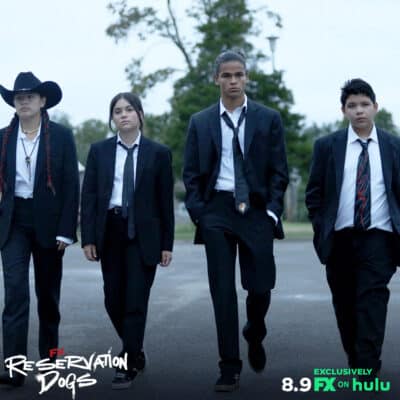
D: A huge gratifying moment in my career happened this year when Paulina Alexis, who’s part of the core cast of Reservation Dogs told me, “You’re the reason that I had started acting, because when I was a little kid I had saw you on Rhymes for Young Ghouls I thought I could do this too.” Now we’re family and we are working together … we’re sisters now. It makes me so proud and excited to see what we can do with a little bit of support, what we can do with representation.
Y: It’s harm-reduction right? I’ve worked with Indigenous youth and led storytelling workshops with them and one of my favourite things about it is watching them in real time realize their own power, or realize their own abilities to create and tell stories.
We both know how important it is for Indigenous people to be telling our own stories. And we can see that in shows like Rutherford Falls and Reservation Dogs. What do you think the future of Indigenous storytelling looks like? Do you think there will be more opportunities for us in writing rooms, behind the scenes, on screen, do you think it’s opening up?
D: I think it’s beginning to open up. I think it’s long overdue and it’s embarrassing for networks and studios that there haven’t been any mainstream Indigenous stories by Indigenous creatives. What’s interesting, and what I’m noticing in Rutherford Falls and Reservation Dogs is one; of course it’s only fitting that the first two Indigenous shows by Indigenous showrunners are comedies! That makes so much sense … humour is how we live!
The other thing that I’m noticing with these two shows is that Western audiences, and the industry as a whole, is taking notice that while these are both Indigenous comedies, and the first of their kind, they are very different. They’re different tonally, creatively, stylistically, and content wise. They are varied in the conversations that they are having. Studios and funding are noticing that we have many stories, and that we have many storytellers … and that every Indigenous story is going to look differently based on who’s telling it. Just like any other Western story! That is the key element that I’m most looking forward to; being able to see all of the different experiences, being able to see all of the genres, all of the stories out there. I’m aware of many projects that are in development, or are in production … There are definitely more stories on the global stage from Indigenous storytellers than we’ve ever seen before. My hope is that this is only the beginning.
Y: Yes I’m wondering how Canadian television will be a part of bringing forward those stories? Because I mean we can see it on APTN this whole time, but we deserve more support!
D: We absolutely deserve more support! I feel like networks are more concerned with checking a box of diversity so they don’t get “cancelled”—when it’s actually about giving a platform to these different communities and sharing stories. Because our communities have such beautiful legends and stories and such gifted storytellers that it’s a shame that audiences don’t get to hear from our communities. They should be so lucky!
Y: I know that there are so many Indigenous playwrights that are trying to shift the narrative and bring in Indigenous joy instead of the content displays of our traumas, which often we’ve seen on all media fronts and all platforms. I can see that there’s so many stories being told, and opportunities for networks to scoop those stories up and provide those platforms because a lot of these stories can translate to film and television very easily, very well. And it brings more Indigenous people more jobs.
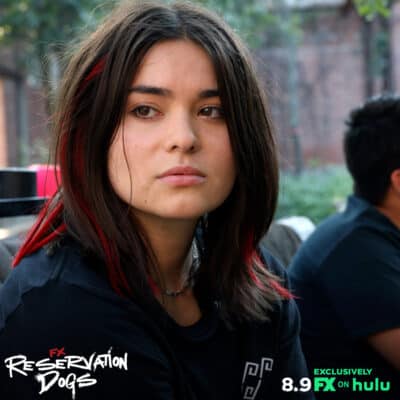
D: Absolutely! I have one filmmaker friend who wrote an incredible pilot for this dark gritty crime story that was about this fictitious reserve that bordered the US and Canada. When they brought it to different Canadian networks they were told “why can’t you bring this to APTN?”. It’s like, APTN doesn’t have the budget to make a show like this, if you want to collaborate with APTN, that’s a different story but why would you assume that because it’s following Indigenous people that widespread audiences couldn’t connect to it?
Y: That’s the thing, right? Like this idea that widespread audiences can’t connect to our stories is again absolute nonsense.
D: Exactly! Meanwhile, we’ve been forced to identify with every white protagonist that’s been shoved down our throats, since the beginning of the film industry.
One of my favourite elements of Reservation Dogs is Lane Factor, who’s like a local kid from Oklahoma, who happened to audition for the show and booked one of the leads (Cheese), and plays a really nerdy native kid from Myrtle, Oklahoma and I’m like, “I’m a really nerdy Native kid!’ Our community is full of them and I can’t remember a character like that on mainstream TV. We’ve rarely been afforded the humanity to be nerdy or to be grumpy … to be hilarious, and goofy, and everything in between! In the film and TV industry our identity has been reduced to the chiefy and stoic stereotype.
Y: I was going to say – we are not allowed to be anything but braids and feathers!
D: And spiritual! My spirituality does NOT look like that.
(Combination Auntie laugh)
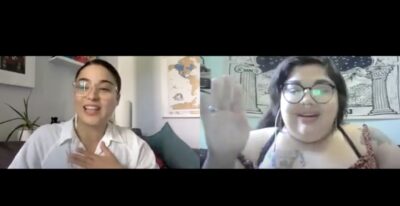
Y: You said something earlier that made me think of politics in storytelling. I’m a storyteller where politics are inevitably in all the stories I tell, but I also think that there’s a part of it as Indigenous people that whenever we are given a platform it’s almost inherently political. I guess what are your thoughts on politics in art and politics in storytelling?
D: I mean I grew up in Kahnawà:ke, where the legacy of the 1990s Oka crisis, before that happened, our language was nearly extinct and there wasn’t a lot of pride within the community for being Kanien’kehá:ka. Whereas after the Oka crisis there’s a whole generation of children who use Kanien’kehá first names, even myself. I was born as Kawennáhere Devery Jacobs. It’s a very personal name for me which is why I don’t use it as my working name. And I’ll use it within my community, but like I grew up in a community that was ready to fucking throw down a blockade at any minute. And so, I didn’t know that there was any other way to be but being political.
I saw how little the Canadian education system informed people about our history and who we are and what’s happened to us. So I felt a responsibility to educate people. And I would always go out of my way to catch people up to speed who were willing to listen and willing to learn. And, both were quite exhausting, and now I feel like I’ve landed somewhere in the middle, where there are many people who do that important work and I feel like I’m best suited to telling stories and focusing on educating people through humanizing them through stories. Whether it’s in front of the camera as an actor or behind the camera as a writer, director, producer, filmmaker. There are definitely more stories on the global stage from Indigenous storytellers than we’ve ever seen before. My hope is that this is only the beginning. There are definitely more stories on the global stage from Indigenous storytellers than we’ve ever seen before. My hope is that this is only the beginning.
Y: Yeah we deserve it!
D: Absolutely! We do !
Y: We deserve to not have to always be fighting and always be having to be political and always having to say something. People ask me a lot ‘why can’t you just be an artist?’ Or ‘why do you have to be the one?’ And I’m like – we have to do something. I can’t not do something. I think about the people coming up behind us, the youth, and how exciting it is that maybe because of the work that we do, that maybe they don’t have to work as hard. Like, they can just be themselves and tell their stories just as they are without having to fit in an agenda or be political.
D: I look forward to the day!
Y: Who are some of your Indigenous heroes? And who would you like to work with in the future?
D: Um, I swear I’ve got some Mohawk magic because every time I say I want to work with somebody, or I put them on my vision board, I’ll get to work with them!
Y: MANIFESTING!
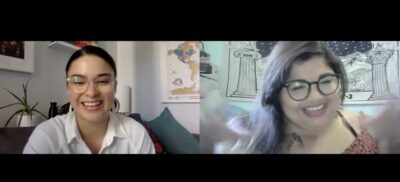
D: I got to work with Neil Gaiman who was a hero of mine, and also like Taika Waititi 2010 film Boy is my favourite movie of all time, and I kid you not I have Taika’s face, and the cast of Boy and Tribeca all on my vision board from two years ago, so I don’t why this is happening but I’m like the ancestors are looking out for me! I got some Mohawk magic! I guess in terms of people I’d like to work with and who are my heroes I don’t know how this would happen because she’s a documentary filmmaker but I love Alanis Obomsawin’s work, I think she’s incredible. I’d love to work with Taika where he gets to direct me, instead of just being an executive producer, that would be even greater! I’d love to work with Barnaby again. He is just the reason why I’m in the film industry today. He really fought for me to land the role of Aila. And I was like on a different path when I got cast in that because I never thought it would be possible to have a career as an actor being a kid from the res who’s an English speaker in a french speaking province. I’m like some weird serendipitous shit because we ended up filming Rhymes for Young Ghouls five minutes from my house on my reserve. Those are definitely some of many legends who I look up to in the film industry.
Y: That’s so beautiful. I love that manifestation. It’s so real. So my whole work and the collective that I co-run, is based on Indigi-nizing theatre spaces and dismantling the systems of theatre so that we are creating safety in storytelling. Because this idea that you have to suffer for your art, or that you have to be working 24 hours a day, is such nonsense. I feel like we need to focus on the storytelling and the people who are telling the stories – the storytellers. And caring for them in those spaces. It’s so vital. How do you feel like you care for yourself in spaces that might not provide that care for you? How do you protect yourself?
D: I will find myself craving going home to my community and when I can, I’ll go home and oftentimes I’ll refuel. Another part of me will refuel by being surrounded by Indigi-Queer and 2-Spirit folk, that’s a huge relief for me when I can exist, and just be and not have to carry anything outside of myself or bigger than myself. And then it gears me up for when I have to go onto set and be the only Indigenous person in white spaces. And also I go to therapy. I prioritize my mental health and I have been fortunate enough to have access to a psychotherapist and I’ve been going to therapy for four years.
I’ve had many breakthroughs over the pandemic when I had the space and time to sit and reflect. I joke how after 2020, I grew so much that I felt like I had emotional stretch marks all over my body. But yeah a combination of all of those things. I also like to journal, write, and cook for myself and loved ones … it forces you to be present and in the moment because if you are thinking about something else then your food will burn. So you gotta literally be in the moment!
Y: What advice would you give to artists or the youth who might also want to be professional storytellers?
D: I would take advice from Sterlin Harjo. When asked this question he said ‘always tell the truth and to make stories for yourself versus for anybody else’ and I think that encapsulated the advice that I needed when I was growing up.
Y: Is there anything that you would tell your younger rez kid self right now?
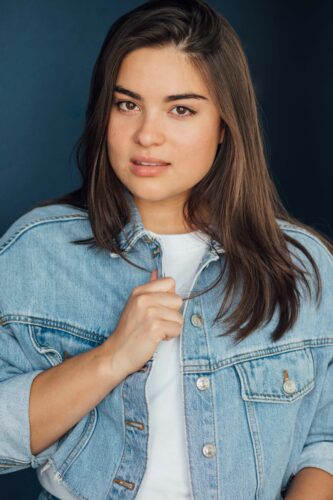
D: Um… hmmmm. I would say – it’s okay to say no. It’s okay to listen to your body, and what you need … and to prioritize what you need. You’re already a great caretaker and you don’t need to go above and beyond to take care of everybody else.
Miigwetch to Devery for sharing time and knowledge and chuckles with me and all of you.
Reservation Dogs premieres on FX on August 9th! You can also catch Devery in Rutherford Falls on Peacock (Amazon Prime Stacked here in Canada). My play bug can be purchased through the Scirocco Publishing website.
It is so important to support and engage with Indigenous content so that we can continue to create and tell our stories on all platforms to reach our communities and beyond. So keep tuning in, turning on to hear what we have to say cuz it’ll most likely be a real gooder!
Follow @kdeveryjacobs and @yobiwankenobe. Reservation Dogs is now streaming on #FXonHulu.


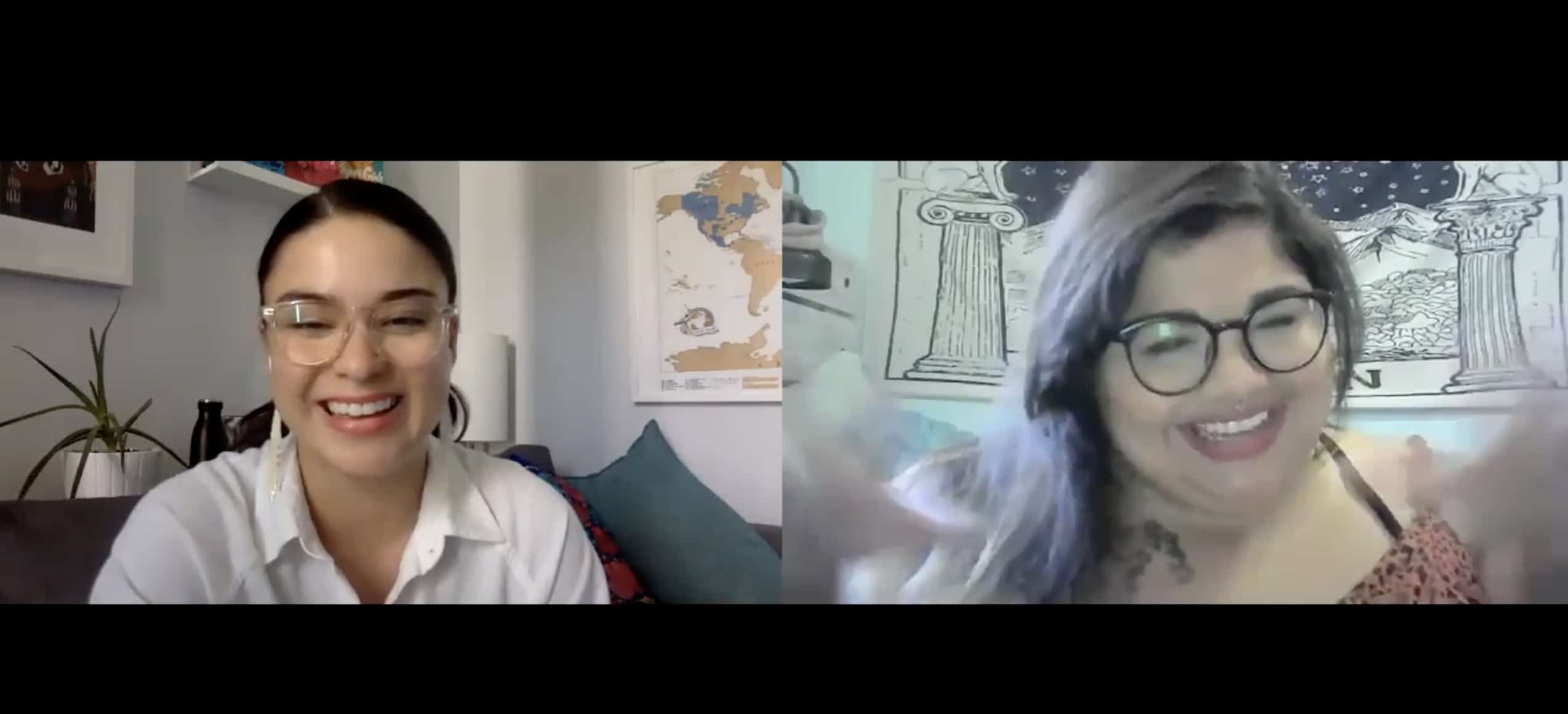

 Follow Us On Instagram
Follow Us On Instagram
